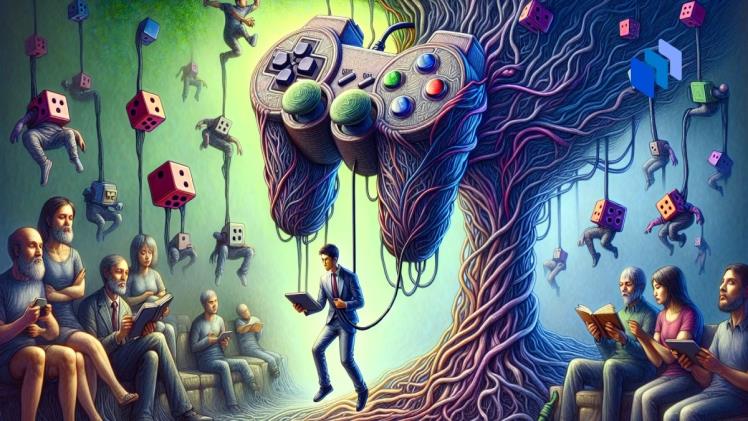Online slot gacor addiction has become a growing concern in recent years, affecting millions of players worldwide. While gaming can be a source of enjoyment and relaxation for many, for some individuals, it can escalate into a compulsive behavior that negatively impacts their lives. Understanding the psychological factors underlying gaming addiction is crucial for addressing this issue and providing support to those affected.
- The Allure of Online Gaming
Online gaming offers an immersive and engaging experience that captivates players of all ages. With richly detailed worlds, compelling storylines, and challenging gameplay, games have the power to transport players to fantastical realms where they can escape the stresses of everyday life.
- Escapism and Avoidance Coping
For some individuals, online gaming serves as a form of escapism—a way to avoid dealing with difficult emotions or real-life problems. By immersing themselves in the virtual world of the game, players can temporarily escape from stress, anxiety, depression, or loneliness.
- Dopamine and Reward Pathways
The brain’s reward system plays a significant role in gaming addiction, as players experience a surge of dopamine—a neurotransmitter associated with pleasure and reward—when achieving in-game goals or completing tasks. This reinforcement mechanism can create a cycle of gaming behavior as players seek out more rewards to maintain the pleasurable sensations.
- Social Connection and Belonging
Online slot provides a platform for social interaction and connection, allowing players to form friendships, join communities, and collaborate with others towards common goals. For individuals who may struggle with social skills or feelings of isolation, the sense of belonging and camaraderie offered by gaming communities can be particularly appealing.
- Sense of Achievement and Mastery
Many online games feature progression systems that reward players with experience points, levels, and in-game rewards for their achievements. The sense of accomplishment and mastery that comes from overcoming challenges and leveling up can be highly motivating for players, driving them to continue playing to achieve their goals.
- Psychological Needs Fulfillment
According to Self-Determination Theory, human behavior is motivated by the desire to satisfy three basic psychological needs: autonomy, competence, and relatedness. Online gaming can fulfill these needs by providing players with a sense of control over their actions, opportunities to develop skills and expertise, and social connections with other players.
- Escalation and Tolerance
Like other forms of addiction, gaming addiction can escalate over time as individuals develop a tolerance to the pleasurable effects of gaming and require increasing amounts of gameplay to achieve the same level of satisfaction. This escalation can lead to excessive gaming behavior and difficulty in cutting back or stopping altogether.
- Withdrawal Symptoms
When deprived of access to gaming, individuals addicted to online gaming may experience withdrawal symptoms similar to those seen in substance dependence, including irritability, anxiety, restlessness, and cravings. These withdrawal symptoms can make it challenging for individuals to reduce their gaming habits or abstain from gaming altogether.
- Cognitive Distortions
Cognitive distortions, or irrational beliefs and thought patterns, can contribute to gaming addiction by reinforcing maladaptive behaviors and justifying excessive gaming habits. Common cognitive distortions seen in gaming addiction include minimizing the negative consequences of gaming, rationalizing excessive gaming as a coping mechanism, and overestimating the benefits of gaming.
- Co-occurring Mental Health Disorders
Gaming addiction often co-occurs with other mental health disorders such as depression, anxiety, ADHD, or impulse control disorders. These underlying mental health issues can exacerbate gaming addiction and complicate treatment efforts, highlighting the importance of addressing both gaming addiction and co-occurring disorders simultaneously.
- Environmental Influences
Environmental factors such as access to gaming devices, peer influences, and parental supervision can also play a role in the development of gaming addiction. Environments that promote excessive gaming, lack of parental oversight, or social norms that prioritize gaming over other activities can contribute to the onset and maintenance of gaming addiction.
- Psychological Vulnerability
Certain individuals may be more susceptible to gaming addiction due to underlying psychological vulnerabilities such as low self-esteem, social anxiety, or a propensity for sensation-seeking behavior. These vulnerabilities can predispose individuals to seek out the gratification and validation provided by gaming, leading to the development of addictive gaming habits.
- The Impact of Gaming Addiction
Gaming addiction can have profound consequences on various aspects of an individual’s life, including their physical health, mental well-being, academic or occupational functioning, and relationships with family and friends. Left untreated, gaming addiction can spiral out of control, leading to financial problems, social isolation, and diminished quality of life.
- Treatment Approaches
Effective treatment for gaming addiction typically involves a combination of psychological interventions, behavioral therapies, and lifestyle modifications. Cognitive-behavioral therapy (CBT), mindfulness-based interventions, family therapy, and support groups can help individuals develop healthier coping strategies, address underlying issues, and reduce gaming-related behaviors.
- Prevention and Education
Preventing gaming addiction requires a multifaceted approach that includes education, awareness-raising, and the promotion of healthy gaming habits. Parents, educators, and healthcare professionals play a crucial role in educating individuals about the risks of gaming addiction, promoting responsible gaming behaviors, and providing support to those who may be struggling with excessive gaming habits.






